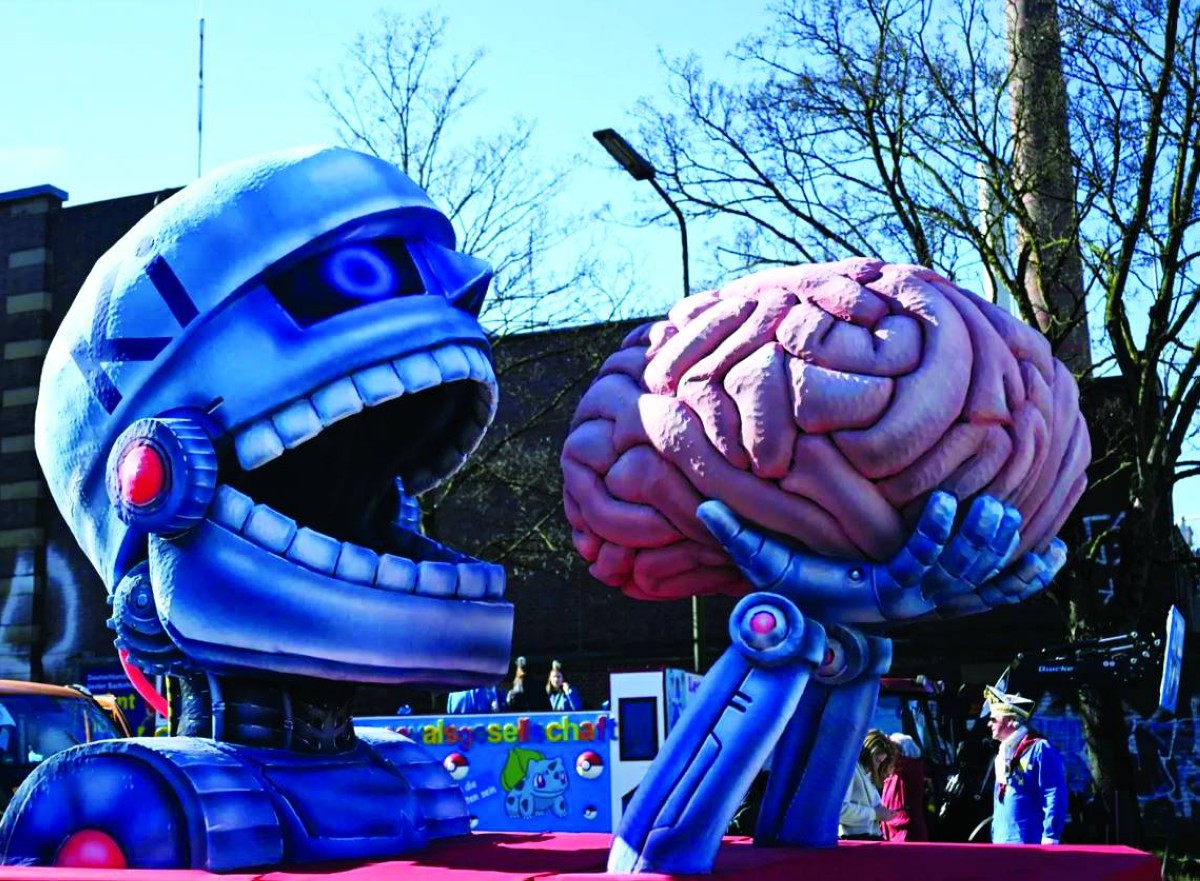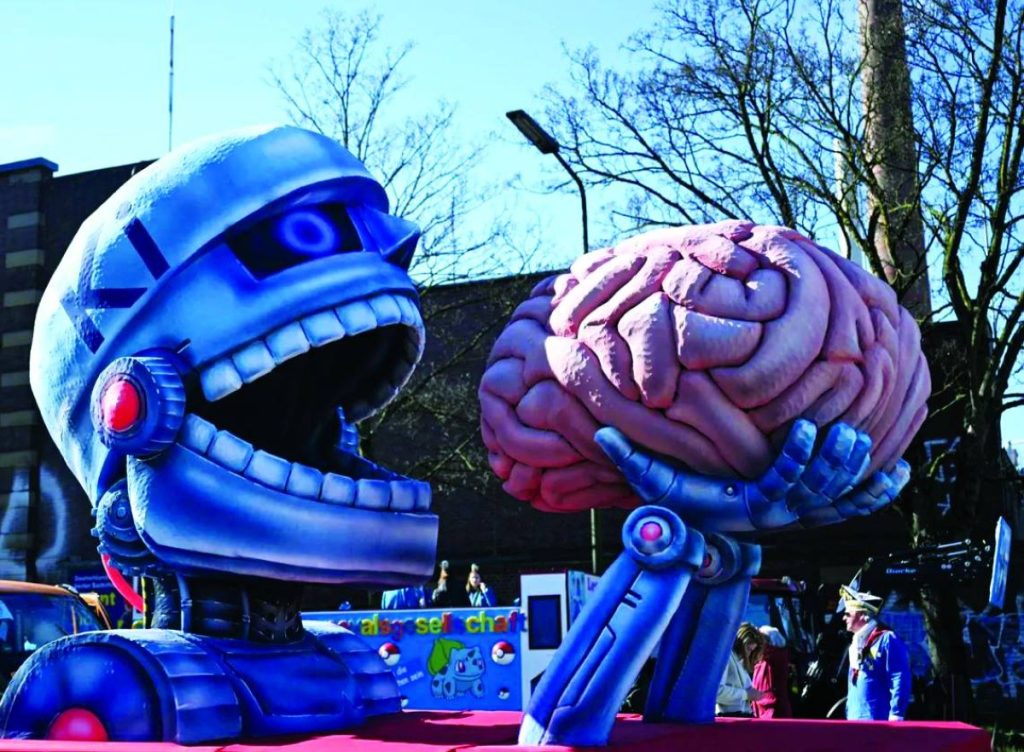كشف موقع “سايكولوجي توداي” الأمريكي، عن دراسة مرعبة حول تأثيرات الذكاء الاصطناعي على العقل البشري، مع إجابات تحليل تجعل من الاقتراب المتزايد أو التعامل المفرط مع دردشات العقل الاصطناعي أقرب للإدمان الذي يفقد الفرد في بعض الحالات قواه العقلية أشبه برجل لا يستطيع الحياة بعيداً عن تلك الدردشات ويصبح خاملاً عقلياً.
ومن أهم الآثار السلبية المحتملة والمخاوف من إدمان التعامل مع الذكاء الاصطناعي والدردشات الفورية الكسل المعرفي، حيث تزايد القلق من أن استخدام أدوات الذكاء الاصطناعي لحل المشكلات المعقدة أو الإجابة عن الأسئلة قد يقلل من قدرتنا على التفكير بشكل مستقل. عندما يتم تقديم الإجابات جاهزة، تقل الحاجة إلى بذل الجهد الذهني الضروري لعملية التفكير وحل المشكلات.
تآكل الذاكرة
ومن المخاوف التي لا تقل عن الخمول الذهني والكسل العقلي مشكلة تآكل الذاكرة والتعلم، حيث يشير بعض الخبراء إلى أن الاعتماد على الذكاء الاصطناعي لتذكر المعلومات قد يؤثر سلباً على قدرتنا على تخزين واسترجاع المعلومات في الذاكرة. قد نصبح أقل مهارة في حفظ الحقائق الأساسية، مما يضر بعمليات التعلم على المدى الطويل. كما يؤدي الاعتماد على الخوارزميات إلى ضعف قدرتنا على التشكيك في المعلومات، مما يجعلنا أكثر عرضة للمعلومات المضللة، خاصة إذا كانت أداة الذكاء الاصطناعي تفتقر إلى التحقق من الحقائق.
وفي دراسة مماثلة يكشف موقع “بي سايكولوجي توداي” (Psychology Today) الأمريكي، أن أنظمة الذكاء الاصطناعي المعاصرة، وخاصة تلك التي تدير خوارزميات وسائل التواصل الاجتماعي ومحركات توصية المحتوى، تعمل على خلق ما يعرفه علماء النفس على أنه تحيزات معرفية منهجية على نطاق غير مسبوق.
تضييق الطموحات
قد يُؤدي التخصيص المُدار بالذكاء الاصطناعي، رغم فائدته الظاهرة، إلى ما يُطلق عليه علماء النفس المعرفي “تبلور التفضيلات”، حيث تصبح رغباتنا أكثر تضييقاً وقابلية للتنبؤ. تُوجّه تدفقات المحتوى المُخصصة بشكل مُبالغ فيه تطلعاتنا نحو نتائج مجدية تجارياً أو مُلائمة خوارزمياً، مما قد يُحد من قدرتنا على اكتشاف الذات وتحديد الأهداف بصدق.
يمتد التأثير النفسي للخوارزميات المُحسّنة للتفاعل إلى أعماق حياتنا العاطفية. هذه الأنظمة، المصممة لجذب الانتباه والحفاظ عليه، غالباً ما تستغل أنظمة المكافأة في أدمغتنا بتقديم محتوى مشحون عاطفياً – الغضب، والفرح العابر، والقلق. وهذا ينشئ ما يطلق عليه الباحثون “اضطراباً عاطفياً”، حيث تضعف قدرتنا الطبيعية على خوض تجارب عاطفية دقيقة ومستدامة بسبب نظام من التحفيز المنظم خوارزمياً.
ربما يكون دور الذكاء الاصطناعي في إنشاء وتعزيز فقاعات التصفية أكثر ما يثير القلق من منظور نفسي. تستبعد هذه الأنظمة المعلومات الصعبة أو المتناقضة بشكل منهجي، مما يؤدي إلى ما يطلق عليه علماء الإدراك “تضخيم التحيز التأكيدي”. عندما تُعزز أفكارنا ومعتقداتنا باستمرار دون أي تحدٍ، تضمر مهارات التفكير النقدي، ونفقد المرونة النفسية التي تُمكّننا من النمو والتكيف.
تتزايد تجربتنا الحسية – وهي جوهرية لسلامتنا النفسية – عبر واجهات رقمية مُعدة بالذكاء الاصطناعي. قد يؤدي هذا التحول نحو الإحساس المُوسّع إلى ما يُطلق عليه علماء النفس البيئي “عجز الطبيعة” و”الانفصال المُتَجَسِّد”، حيث يتضاءل تفاعلنا المباشر وغير المُوسع مع العالم المادي، مما قد يؤثر على كل شيء، من تنظيم الانتباه إلى المعالجة العاطفية.
نقاط إيجابية
فيما يرى بعض الخبراء أن الذكاء الاصطناعي يمكن أن يعزز قدراتنا المعرفية بدلاً من أن يضعفها، حيث يمكن أن يساعد الأطباء، المهندسين، ورجال الأعمال على تحليل كميات هائلة من البيانات، مما يؤدي إلى اتخاذ قرارات أفضل وأكثر دقة. كما يمكن للأدوات المدعومة بالذكاء الاصطناعي أن توفر أفكاراً ونقاط انطلاق جديدة للمبدعين، مما يساعدهم على تجاوز الحواجز الفكرية وتوليد أفكار لم تكن ممكنة من قبل. وأيضاً من خلال توليه المهام الروتينية والمملة، يتيح الذكاء الاصطناعي لعقولنا التركيز على التفكير النقدي، حل المشكلات المعقدة، والعمليات المعرفية التي تتطلب مهارات بشرية فريدة.














Recommended for you
مدينة المعارض تنجز نحو 80% من استعداداتها لانطلاق معرض دمشق الدولي
طالب الرفاعى يؤرخ لتراث الفن الكويتى فى "دوخى.. تقاسيم الصَبا"
تقديم طلبات القبول الموحد الثلاثاء و640 طالبا سيتم قبولهم في الطب
البريد المصري: لدينا أكثر من 10 ملايين عميل في حساب التوفير.. ونوفر عوائد يومية وشهرية وسنوية
الجغبير: القطاع الصناعي يقود النمو الاقتصادي
سمو الشيخ عيسى بن سلمان بن حمد آل خليفة يستقبل سفير الولايات المتحدة الأمريكية لدى مملكة البحرين